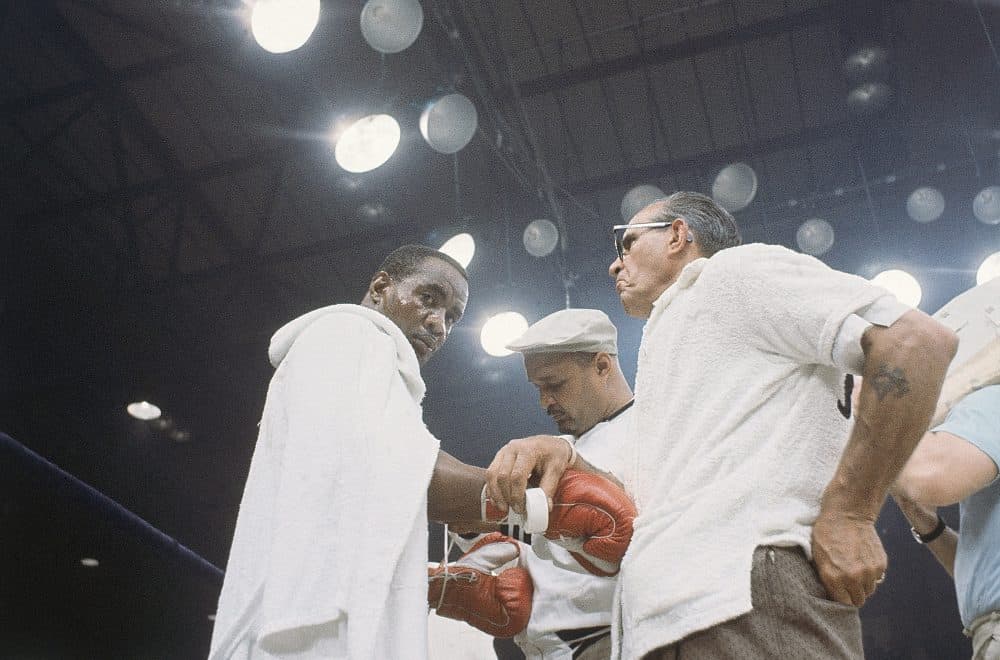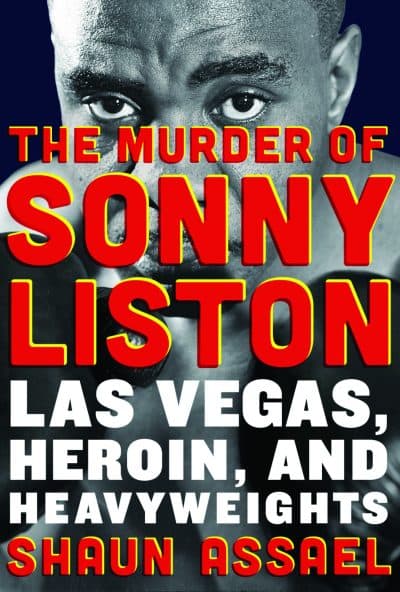Advertisement
One Journalist's Attempt To Solve 'The Murder Of Sonny Liston'
Resume
Lots of boxers can say they never had it easy.
Sonny Liston, the heavyweight champion of the world for a little while in the early '60s, is among them.
"He was born the 24th of 25 children in Forrest City, Arkansas, a place so poor — his father was a sharecropper — that his arrival in the world was not documented with a birth certificate," author and journalist Shaun Assael says.
Assael has learned a lot about Sonny Liston.
Lots of other people know a little — that Liston fought Muhammad Ali twice, for example. In the first of those fights, in 1964, Liston lost his heavyweight title. In the second, in 1965, he tumbled to the canvas after what some observers called "the phantom punch," meaning he fell over as soon as the opportunity presented itself, and he stayed down, enraging Ali.
Maybe those people who know a little are also aware that Sonny Liston died in 1970, allegedly of a heroin overdose, and that he was dead in his bed in his house in Las Vegas for about a week before his wife came home and found him.
Liston's Life Before And After Boxing
Some of the material in Liston’s life story might have worked as well in fiction. Take, for example, the way Liston got into boxing after he’d gone to prison for, as Assael puts it, "beating people over the head with a lead pipe for five cents."
"There was a priest who took a shining to Sonny, got him into the sports program at the penitentiary, and found that Sonny had an aptitude for boxing," Assael says. "You know, he punched with the force of a government crash test."
"Whether or not Sonny actually broke legs, I don’t know. But throughout his life all that really mattered was that once he stared at you, you felt as if your legs were gonna be broken."
Shaun Assael
Which was fine as long as Liston was in jail, being managed by a priest. He got to be pretty good at knocking people down within the rules. Too good to be ignored when he got out.
"And in the '40s, when this happens, there is only one way for a boxer to really get ahead, and that’s by being sponsored by the mob," Assael says.
In the early '50s, Liston hooked up with John Vitale. Among other things, Vitale ran a local union having to do with cement. Among other things...
"Vitale had him — got him a union card and a job for $25.00 a week working at the cement local," Assael says. "Of course, Sonny never really hauled cement. What he did is, any time there was a strike break or anybody who needed their legs broken, Sonny would show up with Vitale. Whether or not Sonny actually broke legs, I don’t know. But throughout his life all that really mattered was that once he stared at you, you felt as if your legs were gonna be broken."
The excitement of Liston’s early days aside, Assael became especially interested in the final year of the ex-champ's life, when Liston was living in Las Vegas.
"You have to envision him: He’s at the back end of his career, but still a formidable face, and people recognize him, and he has a place at the International Hotel," Assael says. "You know, he’d stake himself out at the Keno Lounge there, let people gawk at him, and he’d sell $50 bags of cocaine, and you could buy cocaine from Sonny Liston. He lived on a golf course in a white suburb, and his neighbors were movie stars and casino executives. But at night he’d drive to the shiftless soul of the ghetto. And he didn’t just drive — he drove his pink Cadillac convertible right down the strip."
One of the places where Sonny parked his Cadillac was owned by a fellow named Earl Cage, who was either a beautician who sold cocaine or a cocaine dealer who did some hairdressing. One wrong night, well after Sonny Liston had lost to Ali for the second time, he found himself in Earl Cage’s place. He probably wasn’t looking for a trim.
"And when the cops busted Earl Cage, there were several people in the house," Assael says. "Oddly, Sonny, who was there, was the only one who was let go. And Earl Cage thought Sonny had set him up. And it very likely could have been Earl Cage who arranged for Sonny’s murder."
Shaun Assael doesn’t buy the official story that Sonny Liston died of a drug overdose. For one, Assael thinks the Las Vegas police planted the heroin in Liston’s house after his body was discovered. Beyond that, Assael feels like there were just too many dubious characters like Cage who felt they’d be better off — safer — if Sonny Liston was dead.
It could also have been another dealer who’d done business with Sonny; the dealer’s son told Assael that he and Sonny had used heroin together on various occasions — or perhaps somebody else altogether, maybe somebody who thought Liston had cheated him after Sonny got into the business of selling drugs himself.
"There were five, six people who plausibly could have done this," Assael says.
The Mystery Of Liston's Death
As he became entangled in the various possibilities, Shaun Assael began to feel as if he’d stumbled into a real live game of Clue. He knew he had the makings of a book, and every time he began to despair that the book might not have a definitive ending, he’d find yet another lead.
"I had this constellation of characters," he says. "The other character we haven’t gotten to yet, and I’ll just say briefly, was a casino executive named Ash Resnick, who the FBI had long considered a fix point between the mob and boxing, and a lot of people think that Ash Resnick might have taken a contract out on Sonny."
So he had Cage, and Resnick, and those other five or six people Sonny’d antagonized in one way or another. And he had a story about how Sonny, drunk one night, had bragged that by staying on the canvas that night in 1965 while Muhammad Ali shouted at him to get up, Sonny had insured himself a slice of Ali’s future purses. Elementary boxing economics. And it’s not hard to imagine that by blurting that out, Liston had perhaps given several other people motives to kill him.
So Assael began again to think the story of the mystery of Sonny Liston’s death would offer his readers only the opportunity to guess which bad guy had been bad enough to add murder to his resume.
And then, one day, the mail arrived.
"I got an envelope sent to me with no return address," Assael says. "And in this envelope is a transcript, given 11 years after Sonny’s death, and it’s given by an informant for the Las Vegas Police Department, and he’s pointing the finger and he says, 'I know who killed Sonny Liston. This person told me he killed Sonny Liston.'"
The informant had fingered a former Las Vegas police officer famous for the drug busts he’d made by pretending to be an addict.
In case you’ve lost count, we’re up to over half a dozen potential bad guys who could have killed Liston or paid somebody else to do it.
Anyway, Assael learned that the retired police officer, whose name was Larry Gandy, had reportedly gone into business for himself, and the informant claimed the rogue officer had said he’d been hired to kill Sonny.
"He threw an arm around me, and the first words out of his mouth were, 'I guess you’re here to ask me if I killed Sonny Liston.'"
Shaun Assael
The informant had died in his garage in a car full of carbon monoxide after who knows who had turned the key in the ignition. But Larry Gandy, the ex-cop, was still around.

"You know I put my best investigative hat on, and my trench coat, and I sent him an email. How? Through Facebook. That’s where I found him," Assael says. "And I sent him an email and I said, 'Would you like to talk to me?' And the last third of the book is really what happened when he wrote me back and said, 'Sure, I’ve been carrying this stone around for 30 years.'
"I drove to Red Rock, which is right outside of Las Vegas. Knocked on his door. He opened it up, looking like Santa Claus in the offseason. And he threw an arm around me, and the first words out of his mouth were, 'I guess you’re here to ask me if I killed Sonny Liston.'"
You’re hoping the answer to that question was "yes," right? I mean, who needs a game of Clue that doesn’t end with everybody knowing that Colonel Mustard did it with a candlestick in the drawing room
But real life wouldn’t cooperate. Larry Gandy said he didn’t do it. But he didn’t buy the overdose story. He liked Earl Cage for the hit. You remember Earl Cage, right? Beautician and cocaine dealer?
In the simplest terms, Shaun Assael knew the end of the story before he began telling it. Sonny Liston, once the heavyweight champ, died at the age of who-knows-what some days before Dec. 30, 1970. A lot of his life was mysterious and messy. His death was, too. Maybe he was murdered. Maybe he was lost.
"He never knew when he came into the world, and I think he spent most of his life wondering why he was in it," Assael says.
You can read more about Shaun Assael’s investigation in his book, "The Murder of Sonny Liston: Las Vegas, Heroin, and Heavyweights."
This segment aired on February 4, 2017.
